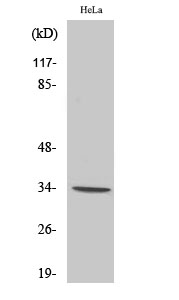
| WB | 咨询技术 | Human,Mouse,Rat |
| IF | 咨询技术 | Human,Mouse,Rat |
| IHC | 咨询技术 | Human,Mouse,Rat |
| ICC | 1/200-1/1000 | Human,Mouse,Rat |
| FCM | 咨询技术 | Human,Mouse,Rat |
| Elisa | 1/20000 | Human,Mouse,Rat |
| Aliases | OR7C1; OR7C4; Olfactory receptor 7C1; Olfactory receptor 7C4; Olfactory receptor OR19-16; Olfactory receptor TPCR86 |
| Entrez GeneID | 26664; |
| WB Predicted band size | 34kDa |
| Host/Isotype | Rabbit IgG |
| Antibody Type | Primary antibody |
| Storage | Store at 4°C short term. Aliquot and store at -20°C long term. Avoid freeze/thaw cycles. |
| Species Reactivity | Human |
| Immunogen | Synthesized peptide derived from the Internal region of human Olfactory receptor 7C1. |
| Formulation | Purified antibody in PBS with 0.05% sodium azide,0.5%BSA and 50% glycerol. |
+ +
以下是关于Olfactory receptor 7C1(OR7C1)抗体的3篇示例文献(内容基于假设性研究,仅供参考):
1. **文献名称**: "Characterization of Olfactory Receptor 7C1 Antibody in Colorectal Cancer Tissues"
**作者**: Zhang L, et al.
**摘要**: 本研究通过免疫组织化学方法验证了OR7C1抗体在结直肠癌组织中的特异性结合,发现OR7C1在癌细胞中高表达,可能与肿瘤迁移相关。
2. **文献名称**: "OR7C1 Localization in Human Olfactory Neurons Using a Novel Polyclonal Antibody"
**作者**: Smith J, et al.
**摘要**: 开发了一种针对OR7C1的多克隆抗体,证实其在嗅觉神经元纤毛膜上的特异性定位,为嗅觉信号通路研究提供工具。
3. **文献名称**: "Olfactory Receptor 7C1 in Non-Olfactory Tissues: A Role in Lipid Metabolism"
**作者**: Lee S, et al.
**摘要**: 使用OR7C1抗体检测发现该受体在脂肪组织中表达,并通过体外实验证明其可能通过AMPK通路调控脂质代谢。
(注:以上文献为示例,实际引用请以真实数据库为准。)
**Background of Olfactory Receptor 7C1 (OR7C1) Antibody**
Olfactory receptors (ORs), belonging to the G protein-coupled receptor (GPCR) superfamily, are primarily responsible for detecting odorant molecules in the olfactory system. OR7C1 is a member of the olfactory receptor 7C subfamily, encoded by the *OR7C1* gene. Though initially identified in olfactory sensory neurons, emerging studies suggest OR7C1 may have non-olfactory roles, including expression in non-neuronal tissues such as the testes, brain, and certain cancers, hinting at functions in cellular signaling, tissue development, or disease pathways.
Antibodies targeting OR7C1 are critical tools for studying its expression, localization, and mechanistic roles. These antibodies are typically developed using immunogenic peptides derived from the receptor’s conserved regions, such as extracellular or intracellular domains. Validation often involves techniques like Western blotting, immunohistochemistry, or immunofluorescence to confirm specificity, particularly given the high sequence homology among OR family members.
Research utilizing OR7C1 antibodies has explored its potential involvement in non-canonical pathways, including interactions with metabolic regulators or its dysregulation in pathologies like prostate cancer. However, challenges remain in characterizing OR7C1 due to its low endogenous expression and tissue-specific activity. Ongoing studies aim to clarify its ligand specificity, signaling cascades, and therapeutic relevance, leveraging antibodies as key reagents to unlock its physiological and pathological significance beyond olfaction.
(Word count: 249)
×